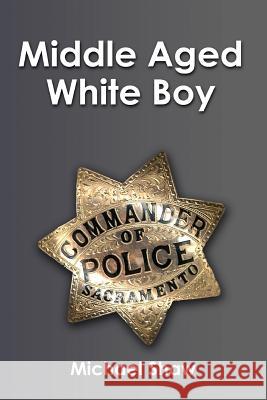Middle-Aged White Boy » książka
Middle-Aged White Boy
ISBN-13: 9781463617783 / Angielski / Miękka / 2011 / 394 str.
In the mid '60s a very young Sacramento police officer, Michael Shaw, was thrown into a battlefield of shooting, sniping and rioting that marked the continuation of the black civil-rights movement in this country. He was involved in an era of violence that came partially as a result of unrest in the ghettos of large cities and race discrimination. It was a time of change that cost careers and lives. Gunshots rang out nightly for weeks on end as he and other officers fought to maintain peace. Shaw's career began as a police patrolman on September 13, 1965. He loved his work and every call and promotion was an adventure worth telling, even when a bloody, deadly police shooting almost claimed his life the first year on The Job. That easily could have ended his career, but instead, it ended abruptly 29 years later on November 10, 1993, only not from a bullet. The end marked yet another victim of race discrimination. First promoted to sergeant in 1970, he spent years as a uniformed sergeant and homicide supervisor. As a lieutenant and captain, he spent time supervising the Special Weapons and Tactics Teams (Swat) and the narcotics division. In 1990 he was promoted to commander, and began management of one half of the cities uniformed police resources. But times change. Racism still existed in the '90s, as it did in the '60s, and historically. However, there emerged new targets. Personal agenda's and liberal political power soar to new heights as affirmative action battles rage back and forth in the media as well as in government and educational institutions nationwide. In June of 1992 Sacramento's political arena changed over night. It became the stage for institutional racism. The heart of ethics, fairness, and the law was torn apart by a new city administration. An election brought on an agenda of political power and arrogance never experienced by the commander. Police chiefs and city officials retired to avoid the onslaught of forced changes they knew would come. Those changes brought on unrealistic policy and discriminatory practices that became known as the City of Sacramento's Affirmative-Action Plan. Within months Sacramento's first Hispanic mayor labeled the police department as "lily white" and a new chief of police, Arturo Venegas, gave the nod to a new phrase: "middle-aged white boys-bureaucratic barriers to change." The commander and other senior Caucasian police managers were singled out for removal. The hateful words, "one down and three to go," could be heard joyfully ringing out of the chief's office as the first veteran Caucasian manager is pushed out the front door of the Hall of Justice, leaving others to wonder who would be next. Harassment and sickness devour Shaw's career and he becomes the second with three and four to follow. Supported only by his Christian faith, family and friends he decides that discrimination wouldn't stop him from fighting back. His civil rights became an issue more important than retirement or declining health. Michael and Linda made the decision to take on government power and money, seemingly impossible odds, but it was the right thing to do. With family still working in the department Shaw turns to the courts to battle against the discrimination that had not only claimed his health and destroyed the upper management ranks of the department; it had daily became a cancer eating its way through every level of the institution. "First there were four and then no more," became the battle cry of the plaintiff's attorney, Leo Donahue, a retired United States Air Force jet fighter pilot. The commander and co-plaintiff battled their way through motion after motion in federal court, which concluded with The Trial. The past employer, now a defendant in the United States Federal Court, 5th District, had become the vicious enemy. The city had turned rabid, and did everything possible, not just to win, but to completely destroy the veteran police managers.
Zawartość książki może nie spełniać oczekiwań – reklamacje nie obejmują treści, która mogła nie być redakcyjnie ani merytorycznie opracowana.











